Respite Care for Caregivers of Kids with Autism
Discover respite care for caregivers of kids with autism. Find support, rest, and relief from burnout in this breakthrough resource.

Understanding Respite Care
Respite care is a vital service that provides temporary relief to caregivers of children with autism. It offers caregivers the opportunity to take a break from their caregiving responsibilities, recharge, and attend to their own well-being. In this section, we will explore what respite care entails and why it is immensely important for caregivers of kids with autism.
What is Respite Care?
Respite care refers to the provision of short-term, temporary care for individuals with special needs, such as children with autism. It is designed to give caregivers a break from their caregiving duties and responsibilities. During respite care, the child with autism is cared for by trained professionals or experienced caregivers who understand their unique needs and can provide appropriate support.
Respite care can take various forms, including in-home care, where the child remains in their familiar environment, or out-of-home care, where the child may stay at a specialized facility or with an approved caregiver. The duration of respite care can range from a few hours to several days, depending on the needs and preferences of the caregiver and the child.
Importance of Respite Care for Caregivers of Kids with Autism
Respite care plays a crucial role in supporting caregivers of children with autism. Caring for a child with autism can be physically, emotionally, and mentally demanding. The constant need for supervision, assistance with daily activities, and managing challenging behaviors can lead to chronic stress and burnout for caregivers.
By providing regular respite care, caregivers have the opportunity to take a much-needed break, which can have significant benefits for their overall well-being. Here are some key reasons why respite care is important for caregivers of kids with autism:
- Physical and Emotional Well-being: Caring for a child with autism can be physically exhausting. Respite care allows caregivers to rest, rejuvenate, and take care of their own health. It provides them with a chance to engage in self-care activities, such as exercise, relaxation, or pursuing personal interests, which are essential for maintaining their physical and emotional well-being.
- Strengthening Caregiver-Child Relationship: Taking breaks through respite care can actually strengthen the bond between caregivers and their children with autism. When caregivers have the opportunity to recharge and reduce their stress levels, they can approach their caregiving role with renewed energy and patience. This, in turn, can enhance the quality of interactions and improve the overall relationship between the caregiver and the child.
- Opportunities for Self-Care and Rest: Respite care enables caregivers to focus on themselves for a while, without the constant demands of caregiving. This time for self-care and rest is critical for preventing burnout and maintaining a healthy work-life balance. It allows caregivers to recharge their batteries and return to their caregiving duties with increased resilience and a more positive outlook.
Understanding the value of respite care is essential for caregivers of children with autism. It not only benefits the caregivers themselves but also contributes to the overall well-being of the entire family. By recognizing the importance of taking care of their own needs, caregivers can ensure that they have the physical and emotional resources necessary to provide the best possible care for their child.
Types of Respite Care Services
When it comes to providing support for caregivers of children with autism, respite care services can be a lifeline. Respite care offers temporary relief and assistance to caregivers, allowing them to take a break from their caregiving responsibilities. There are two main types of respite care services that caregivers can consider: in-home respite care and out-of-home respite care.
In-Home Respite Care
In-home respite care provides caregivers with the option to have a respite care provider come to their home to care for their child with autism. This type of care allows the child to remain in a familiar environment, surrounded by their own belongings and routines. In-home respite care providers are trained professionals who are experienced in working with children with autism.
Here are some key aspects of in-home respite care:
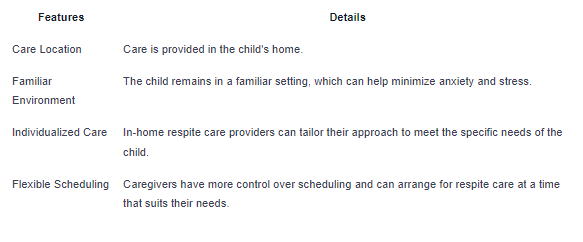
In-home respite care can be particularly beneficial for children with autism who thrive in familiar surroundings and routines. It provides caregivers with an opportunity to take a break while ensuring their child's well-being and safety.
Out-of-Home Respite Care
Out-of-home respite care involves the child with autism being cared for outside of their home, either in a specialized facility or with a respite care provider. This type of care allows children to interact with a different environment and engage in various activities. Out-of-home respite care providers are trained to work with children with autism and create a nurturing and stimulating environment.
Here are some key aspects of out-of-home respite care:
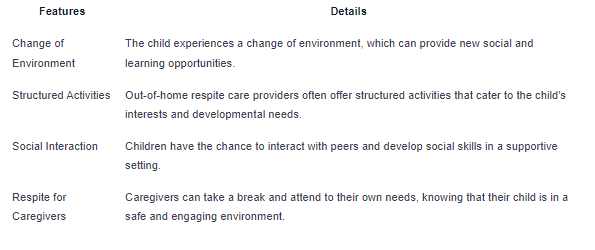
Out-of-home respite care can be a valuable option for children with autism who benefit from social interaction and exposure to different settings. It allows caregivers to have dedicated time for self-care while their child is engaged in meaningful activities.
Both in-home and out-of-home respite care services offer caregivers of children with autism a much-needed break and support system. The choice between the two types depends on the child's individual needs and the preferences of the caregiver. It's important for caregivers to explore these options to find the most suitable respite care service for their unique circumstances.
Benefits of Respite Care
Caring for a child with autism can be both rewarding and challenging. Respite care provides caregivers of kids with autism with much-needed support and relief. Here are some of the key benefits of respite care:
Physical and Emotional Well-being
Caring for a child with autism can be physically and emotionally demanding. Respite care offers caregivers the opportunity to take a break and recharge, promoting their overall well-being. By taking time for themselves, caregivers can reduce stress, prevent burnout, and enhance their ability to provide quality care.
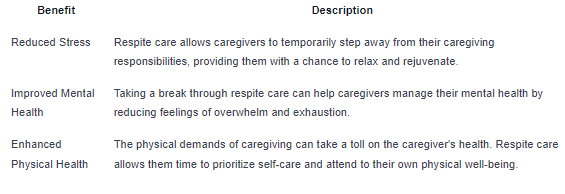
Strengthening Caregiver-Child Relationship
Respite care not only benefits caregivers but also creates opportunities to strengthen the caregiver-child relationship. When caregivers take time for themselves, they can return to their caregiving role with renewed energy and patience, leading to more positive interactions with their child.
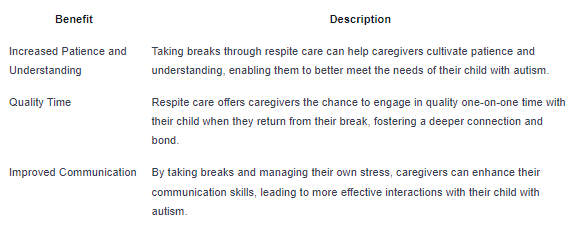
Opportunities for Self-Care and Rest
Respite care provides caregivers with valuable opportunities for self-care and rest. Taking time away from caregiving responsibilities allows caregivers to engage in activities that they enjoy and prioritize their own well-being.
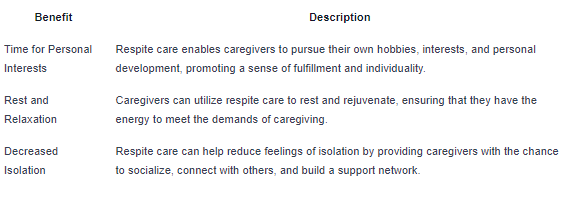
The benefits of respite care extend beyond the immediate relief it provides to caregivers. By prioritizing their own well-being, caregivers can continue to provide the best care possible for their child with autism.
Finding Respite Care Services
When it comes to finding respite care services for caregivers of children with autism, there are several avenues to explore. It's important to tap into local resources and organizations that specialize in providing support for families in similar situations. Additionally, understanding the qualities to look for in respite care providers can help ensure that you find the most suitable assistance for your needs.
Local Resources and Organizations
One of the first steps in finding respite care services is to reach out to local resources and organizations that focus on supporting families with children on the autism spectrum. These organizations often have dedicated programs and services aimed at providing respite care for caregivers. They can connect you with trained professionals, support groups, and other families who have gone through similar experiences.
It's recommended to contact local autism advocacy groups, community centers, and healthcare facilities to inquire about respite care services available in your area. They can provide valuable information on the different options and assist you in navigating the process of accessing respite care.
Qualities to Look for in Respite Care Providers
When selecting a respite care provider, certain qualities and characteristics can help ensure a positive and supportive experience. Here are some key qualities to consider when searching for respite care providers:
- Experience and Training: Look for providers who have experience working with children on the autism spectrum and have received specialized training in autism care and support.
- Patience and Empathy: Respite care providers should demonstrate patience, understanding, and empathy towards both the child with autism and the caregiver. This helps create a nurturing environment for the child and builds trust with the caregiver.
- Flexibility and Adaptability: Autism care can vary greatly from one child to another. Respite care providers who are flexible and adaptable in their approach can better meet the unique needs of each child and provide personalized care.
- Communication Skills: Effective communication is crucial in respite care. Providers should have strong communication skills to effectively collaborate with the caregiver, understand the child's needs, and provide updates on the child's well-being.
- Safety Measures: It's essential to ensure that respite care providers prioritize the safety and well-being of the child. They should follow appropriate safety protocols, be trained in handling emergency situations, and maintain a secure environment.
When interviewing potential respite care providers, don't hesitate to ask about their qualifications, experience, and approach to caregiving. It's important to find a provider who aligns with your caregiving philosophy and can meet the specific needs of your child with autism.
By exploring local resources and organizations and considering the qualities of respite care providers, you can find the support you need as a caregiver of a child with autism. Remember, respite care is a valuable tool that can provide much-needed relief, allowing you to recharge and continue providing the best care for your child.
Planning for Respite Care
When considering respite care for caregivers of kids with autism, proper planning is essential to ensure a smooth and effective experience. This section focuses on two important aspects of planning: creating a respite care schedule and establishing clear communication with respite care providers.
Creating a Respite Care Schedule
Creating a respite care schedule is crucial for both caregivers and care providers. It helps ensure that caregivers have designated time for rest and self-care, while also allowing care providers to plan their availability accordingly. Here are some steps to consider when creating a respite care schedule:
- Assess your needs: Determine the frequency and duration of respite care that would best meet your needs as a caregiver. Consider your own physical and emotional well-being, as well as any other responsibilities you may have.
- Identify available time slots: Take into account your daily and weekly routines, such as work schedules, therapy sessions, and other commitments. Identify time slots that would work best for respite care.
- Find reliable respite care providers: Research and connect with respite care providers who specialize in caring for children with autism. Ensure that their availability aligns with your preferred respite care schedule.
- Coordinate with providers: Once you have identified potential respite care providers, communicate your schedule preferences to them. Discuss their availability and ensure that there is a mutual understanding of the schedule.
- Establish a routine: Consistency is key when it comes to respite care. Establish a routine schedule that both caregivers and care providers can rely on. This helps maintain stability and predictability for the child with autism.
Communication with Respite Care Providers
Clear and effective communication with respite care providers is crucial to ensure that the child's needs are met and the caregiver's concerns are addressed. Here are some tips for effective communication:
- Share relevant information: Provide detailed information about the child's routines, preferences, triggers, and any specific care instructions. This helps the respite care provider understand the child's unique needs and provide appropriate care.
- Maintain open lines of communication: Establish a communication plan with the respite care provider. This may include regular check-ins, sharing updates, and addressing any concerns or questions that arise.
- Provide feedback: Regularly communicate with the respite care provider about the child's progress, any changes in behavior or routine, and any concerns you may have. Openly discuss what is working well and what could be improved.
- Be receptive to feedback: Encourage the respite care provider to share their observations and experiences. Be open to their suggestions and recommendations, as they may have valuable insights to enhance the care provided.
By creating a respite care schedule and maintaining effective communication with respite care providers, caregivers can ensure that their child receives quality care while also prioritizing their own well-being. A well-planned and organized approach to respite care can lead to positive outcomes for both the caregiver and the child with autism.
Supporting Caregivers
Taking care of a child with autism can be a demanding and emotionally challenging responsibility. Caregivers play a vital role in providing support, love, and care to their children. However, it is equally important for caregivers to prioritize their own well-being. In this section, we will explore self-care tips for caregivers and the community support available for caregivers of children with autism.
Self-Care Tips for Caregivers
Caregivers of children with autism often neglect their own needs while focusing on their child's care. However, self-care is crucial for maintaining physical and emotional well-being. Here are some self-care tips for caregivers:
- Take Breaks: Schedule regular breaks to rest and recharge. Use this time to engage in activities you enjoy, such as reading, exercising, or spending time outdoors.
- Seek Support: Reach out to support groups or online communities where you can connect with other caregivers facing similar challenges. Sharing experiences and advice can provide comfort and reassurance.
- Prioritize Sleep: Adequate sleep is essential for overall well-being. Establish a bedtime routine and create a calm environment to promote quality sleep.
- Practice Stress-Relief Techniques: Find stress-relief techniques that work for you, such as deep breathing exercises, meditation, or engaging in hobbies that bring you joy.
- Maintain Healthy Habits: Aim for a balanced diet, regular exercise, and staying hydrated. Taking care of your physical health can positively impact your mental and emotional well-being.
- Delegate Tasks: Don't hesitate to ask for help. Delegate tasks to family members, friends, or trusted caregivers to lighten your load.
- Find Moments of Joy: Seek out activities that bring you happiness and allow yourself to indulge in them. Whether it's listening to music, practicing a hobby, or spending time with loved ones, make time for moments of joy.
Community Support for Caregivers of Kids with Autism
The journey of caregiving can be made easier with the support of a community. Finding and accessing community resources can provide valuable assistance and guidance. Here are some avenues of community support for caregivers of children with autism:
Community Support Resources
Support Groups
Parent Training Programs
Online Forums and Blogs
Workshops and Webinars
Respite Care Services
Counseling Services
Advocacy Organizations
These resources can offer a variety of support, including emotional support, education, training, and access to respite care services. Connecting with other caregivers who understand the challenges you face can provide a sense of belonging and validation.
Remember, supporting caregivers is not just the responsibility of the individual, but also the community at large. By offering understanding, empathy, and practical assistance, we can create a supportive environment where caregivers feel valued and empowered.
In conclusion, caregivers of children with autism need to prioritize self-care to maintain their physical and emotional well-being. Additionally, accessing community support resources can provide valuable assistance and a sense of belonging. By taking care of themselves and seeking support, caregivers can continue to provide the best care for their children with autism.
Sources
https://behavioral-innovations.com/blog/respite-care-benefits-caregivers-of-individuals-with-autism/
https://www.verywellhealth.com/respite-care-for-autism-260445
Similar articles
We’re here to help you

Our team is here to assist you in this process. Contact us for any assistance.
it’s easy to apply
We Accept Most Insurances
Our in-network insurance partnerships make ABA therapy more accessible to families throughout our service areas.







Our Insurance Process
We'll request your insurance details to help us verify your plan's coverage for ABA therapy. Once we've received this information, we'll walk you through your benefits, including copayments, deductibles and out-of-pocket maximums, so you know what to expect in advance.
Our team will then handle the preauthorization and all the necessary paperwork.
.svg)





















.jpeg)


































.jpeg)




.jpeg)







.jpeg)











.jpeg)
















